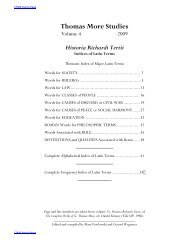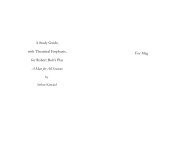life of john picus earl of mirandola - The Center for Thomas More ...
life of john picus earl of mirandola - The Center for Thomas More ...
life of john picus earl of mirandola - The Center for Thomas More ...
You also want an ePaper? Increase the reach of your titles
YUMPU automatically turns print PDFs into web optimized ePapers that Google loves.
10 <strong>Thomas</strong> <strong>More</strong>’s Life <strong>of</strong> John Picus<br />
be<strong>for</strong>e that, not a few famous doctors <strong>of</strong> divinity had approved as good<br />
and clean, and subscribed their names under them¦. But he, not bearing<br />
the loss <strong>of</strong> his fame, made a defence 1 <strong>for</strong> those thirteen questions, a<br />
work <strong>of</strong> great erudition and elegant and stuffed with the cognition <strong>of</strong><br />
many things worthy to be learned. Which work he compiled in twenty<br />
nights; in which it evidently appeareth, not only that those conclusions<br />
were good and standing with the Faith, but also that they which had<br />
barked at them were <strong>of</strong> folly and rudeness to be reproved. Which<br />
defence, and all other things that he should write, he committed (like<br />
a good Christian man) to the most holy judgment <strong>of</strong> our mother, holy<br />
Church¦. Which defence received, and the thirteen questions¦ duly by<br />
deliberation examined, our Holy Father the Pope¦ 2 approved Picus and<br />
tenderly favoured him, as by a Bull <strong>of</strong> our Holy Father, Pope Alexander<br />
VI, it plainly appeareth¦. But the book in which the whole nine<br />
hundred questions with their conclusions were contained (<strong>for</strong>asmuch<br />
as there were in them many things strange and not fully declared and<br />
were more meet <strong>for</strong> secret communication <strong>of</strong> learned men than <strong>for</strong><br />
open hearing <strong>of</strong> common people, which <strong>for</strong> lack <strong>of</strong> cunning might take<br />
hurt thereby), Picus desired himself that it should not be read.¦ And<br />
so was the reading there<strong>of</strong> <strong>for</strong>bidden. 3 ⌐ Lo, this end had Picus <strong>of</strong> his<br />
high mind and proud purpose, that where he thought to have gotten<br />
perpetual praise, there had he much work to keep himself upright, that<br />
he ran not in perpetual infamy and slander. ¬<br />
¦ 2 Here <strong>More</strong> omits six lines <strong>of</strong> Latin in which is described Buonfrancesco, bishop <strong>of</strong> Reggio,<br />
who is praised <strong>for</strong> his “wide-ranging learning...penetrating judgement...and his solid character”<br />
(CW 1:301). / 11 <strong>More</strong> omits eiusque praesidis, here meaning “and the pope” (CW 1:300, 301).<br />
After this <strong>More</strong> omits a brief passage explaining Picus’ reason <strong>for</strong> submitting his Apologia to the<br />
Church and the pope. / <strong>More</strong> omits quae prius calumniis infestatae fuerant, “which had <strong>for</strong>merly<br />
been slanderously attacked” (CW 1:300, 301). / 12 <strong>More</strong> omits “Innocent VIII.” / 14 <strong>More</strong><br />
omits a passage explaining that the text <strong>of</strong> the bull was printed together with the text <strong>of</strong> Picus’<br />
Apologia in Opera omnia. He also omits that Picus “earnestly begged friends and enemies alike,<br />
learned and unlearned, to read the [Apologia] but to leave unread the pamphlet containing those<br />
unqualified conclusions...” (CW 1:303). / 19 <strong>More</strong> paraphrases several lines <strong>of</strong> the Latin text;<br />
while conveying the general sense <strong>of</strong> the original, one conspicuous omission is the fact that Pope<br />
Innocent VIII explicitly <strong>for</strong>bade the reading <strong>of</strong> Picus’ Conclusiones.<br />
1. defence: Picus’ Apologia conclusionum suarum, completed 31 May 1487.<br />
2. With the omission <strong>of</strong> “Innocent VIII” <strong>More</strong>’s syntax seems to imply he is speaking not <strong>of</strong><br />
Innocent VIII but <strong>of</strong> Alexander VI , the later pope who in fact did not issue the bull <strong>for</strong> Picus’<br />
absolution until 18 June 1493.<br />
3. Picus <strong>of</strong>ficially retracted his Conclusiones in July 1487; Pope Innocent VIII ordered their supression.<br />
5<br />
10<br />
15<br />
20











